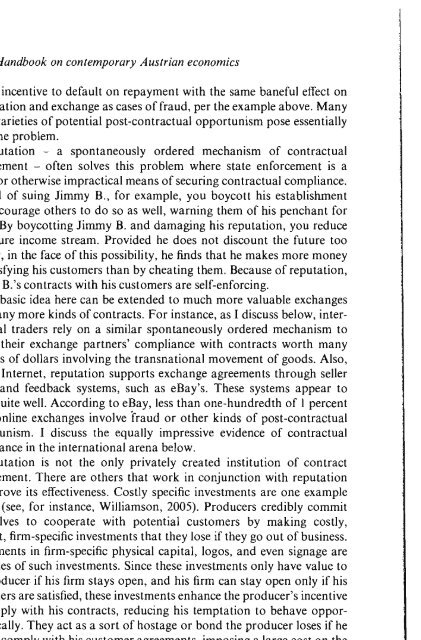Handbook on Contemporary Austrian Economics
Handbook on Contemporary Austrian Economics
Handbook on Contemporary Austrian Economics
You also want an ePaper? Increase the reach of your titles
YUMPU automatically turns print PDFs into web optimized ePapers that Google loves.
138 <str<strong>on</strong>g>Handbook</str<strong>on</strong>g> <strong>on</strong> c<strong>on</strong>temporary <strong>Austrian</strong> ec<strong>on</strong>omics<br />
has an incentive to default <strong>on</strong> repayment with the same baneful effect <strong>on</strong><br />
cooperati<strong>on</strong> and exchange as cases offraud, per the example above. Many<br />
other varieties of potential post-c<strong>on</strong>tractual opportunism pose essentially<br />
the same problem.<br />
Reputati<strong>on</strong> - a sp<strong>on</strong>taneously ordered mechanism of c<strong>on</strong>tractual<br />
enforcement - often solves this problem where state enforcement is a<br />
costly or otherwise impractical means of securing c<strong>on</strong>tractual compliance.<br />
Instead of suing Jimmy B., for example, you boycott his establishment<br />
and encourage others to do so as well, warning them of his penchant for<br />
fraud. By boycotting Jimmy B. and damaging his reputati<strong>on</strong>, you reduce<br />
his future income stream. Provided he does not discount the future too<br />
heavily, in the face of this possibility, he finds that he makes more m<strong>on</strong>ey<br />
by satisfying his customers than by cheating them. Because of reputati<strong>on</strong>,<br />
Jimmy B.'s c<strong>on</strong>tracts with his customers are self-enforcing.<br />
The basic idea here can be extended to much more valuable exchanges<br />
and many more kinds of c<strong>on</strong>tracts. For instance, as I discuss below, internati<strong>on</strong>al<br />
traders rely <strong>on</strong> a similar sp<strong>on</strong>taneously ordered mechanism to<br />
secure their exchange partners' compliance with c<strong>on</strong>tracts worth many<br />
milli<strong>on</strong>s of dollars involving the transnati<strong>on</strong>al movement of goods. Also,<br />
<strong>on</strong> the Internet, reputati<strong>on</strong> supports exchange agreements through seller<br />
rating and feedback systems, such as eBay's. These systems appear to<br />
work quite well. According to eBay, less than <strong>on</strong>e-hundredth of I percent<br />
of its <strong>on</strong>line exchanges involve "fraud or other kinds of post-c<strong>on</strong>tractual<br />
opportunism. I discuss the equally impressive evidence of c<strong>on</strong>tractual<br />
compliance in the internati<strong>on</strong>al arena below.<br />
Reputati<strong>on</strong> is not the <strong>on</strong>ly privately created instituti<strong>on</strong> of c<strong>on</strong>tract<br />
enforcement. There are others that work in c<strong>on</strong>juncti<strong>on</strong> with reputati<strong>on</strong><br />
to improve its effectiveness. Costly specific investments are <strong>on</strong>e example<br />
of this (see, for instance, Williams<strong>on</strong>, 2005). Producers credibly commit<br />
themselves to cooperate with potential customers by making costly,<br />
upfr<strong>on</strong>t, firm-specific investments that they lose if they go out of business.<br />
Investments in firm-specific physical capital, logos, and even signage are<br />
examples of such investments. Since these investments <strong>on</strong>ly have value to<br />
the producer if his firm stays open, and his firm can stay open <strong>on</strong>ly if his<br />
customers are satisfied, these investments enhance the producer's incentive<br />
to comply with his c<strong>on</strong>tracts, reducing his temptati<strong>on</strong> to behave opportunistically.<br />
They act as a sort of hostage or b<strong>on</strong>d the producer loses if he<br />
fails to comply with his customer agreements, imposing a large cost <strong>on</strong> the<br />
producer that he wants to avoid.<br />
The frequent use and success of these particular sp<strong>on</strong>taneous orders<br />
in preventing opportunism has led some to suggest that social interacti<strong>on</strong>s<br />
in general could be based in these arrangements (see, for instance,

















